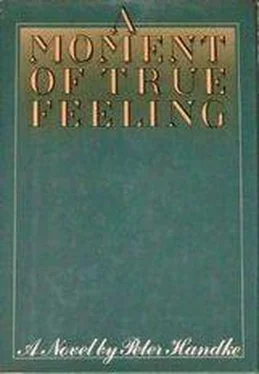In Paris one can usually see the sky without raising one’s eyes; even when looking straight ahead, one sees it at the end of many streets. Consequently Keuschnig noticed that clouds had now come into the sky, white immobile stripes high overhead, and under them, rather low and running at an angle to the stripes, other clouds, whose proximity made them seem somewhat darker, moving rapidly just above the rooftops and changing their shapes before he was able to fix them in his mind. Why, he wondered, am I so struck with the sky? It didn’t exactly strike him; he merely looked at it with interest, but thinking nothing in particular. For a few steps it held his attention so exclusively that afterwards he thought: I wish I could learn to prolong these selfless and yet full moments, when I observe nothing in particular but nothing escapes me. But his very next glance at the clouds soured him. He never wanted to look at anything again. Why couldn’t everything finally disappear — everything! He walked in the middle of the sidewalk with his hands on his hips. He would have liked to shout insults at everyone. Out of my way, you clever clever people! He would shout just one word at a woman, and she would have to think of it as long as she lived. He must find the word to which no one knew the answer!
At the far end of the Champs-Elysées, there was only one thing to catch the eye, the Arc de Triomphe. Looking through it from down here at the Rond-Point, one saw nothing but the western sky, which was reflected in the surface of the wide avenue. “If I looked through the arch from farther up the avenue, I would see the cranes being used to put up still more buildings in the Defense quarter of suburban Puteaux.”—I observe as if I were doing it for someone else! thought Keuschnig. But that was a brief diversion.
In turning into Le Drugstore from the sidewalk of the Avenue Matignon, he suddenly felt saved, for the moment at least. The mere act of TURNING IN — of deviating from his depressing rectilinear course — suggested a break in a journey, and as he moved through Le Drugstore along with many others, in a rhythm, determined by others, of stopping, dodging, and starting up again, his only movements now being Drugstore movements, performed in common with others, he was able to see himself leading a totally different life, derived from his Drugstore feeling, in which all his problems would cease to exist. “That’s it, I’ll start a new life!” he said aloud, on a note of urgency. A memory came to him: Schoolchildren in shorts were standing in a row, in front of them the two team captains, each in turn calling out the names of the boys he wanted on his team. Those named stepped forward. The good players were soon taken, and only the incompetents stood there, squirming with embarrassment: please, please call my name! The next-to-last would still be taken — oh, don’t let me be the last of all, don’t leave me standing here by myself. And here now, those crumpled paper napkins on ketchup-smeared plates, those young women sitting alone, rereading their love letters over their open handbags — in such confusion a game in which someone had to be last ceased to be possible. — At a bookstand Keuschnig bought three diner’s guides. He would read them from cover to cover. One more thing to go by, he thought.
He stepped out into the street again … That sordid Drugstore with its trampled pommes frites on the floor and its already dog-eared magazines! Even as he watched it — while waiting to cross the street — the sky clouded over. He tried to remember the new feeling he had had just after turning in. Turning in where? All at once he couldn’t remember anything at all, neither that nor anything else. He could list all sorts of things but remember nothing. He retained the facts, but not the feelings. When some years ago the nurse at the maternity hospital had shown him the child for the first time through the glass partition, something in him had undoubtedly stirred at the sight of that face, which the child itself had badly scratched. He had known a feeling of happiness, of that he was sure — but what had it really been like? He couldn’t remember the feeling, what he remembered was the fact of having been happy. He had been moved, no doubt of it, but even with closed eyes he couldn’t bring back the feeling. “Try inhaling slowly.” He tried … but his breath went down the wrong way and he gagged. — He saw an empty bus going by; the low-lying sun shone on it from the side, lighting up the serried nose prints on the windows. An animal, thought Keuschnig unremembering. The only way he could keep on walking was to count his steps out loud: one … and two … and three, as though he had to trick himself into moving.
As he crossed the playground in the Carré Marigny, which now, at the end of July, was deserted, the whole sky was overcast. A strong cold wind was blowing and the rustling of the chestnut trees was so loud he couldn’t hear the traffic on the Champs-Elysées. Little dead twigs crunched underfoot. The horses of the merry-go-round had been covered with sacking and plastic for the summer and tied with heavy twine. It was beginning to get dark; Keuschnig was alone in the Carré, dust was blowing up his nose. By then the wind was so strong that he was suddenly seized with uncontrollable panic. He ran to the bus-stop phone on the Avenue Gabriel and called home. Agnes was there — it was she who picked up the phone. Pleased with herself for answering, she bit into a piece of candy …
As he walked on, he remembered that he had just been afraid. A feeling;—remember it. What had it been like? His muscles and sinews had suddenly frozen into a structure of their own … a kind of second skeleton. Yes, that’s what fear had been like. I’ll have to rediscover all these feelings! he thought.
Although theAvenue Marigny, on which the Elysée Palace is situated, is in the very center of Paris, there isn’t a single shop on it. The windows of an inhabited house are a rarity, all one sees is chestnut trees and high park walls until one comes to the restaurant and newsstand at the corner of the rue du Faubourg Saint-Honoré. For an approach to so prestigious a residence the Avenue Marigny is neither very long nor very wide, but it is straight and open. Few cars park on it, not even on the sidewalks, which are blocked off by rows of concrete posts. — Pedestrians, too, are rare; only policemen stride back and forth outside the high walls, their hands behind their backs. Involuntarily, as he turned into the avenue, Keuschnig reached for his passport, as if it were forbidden to enter such a thoroughfare without one’s papers … At the corner a policeman was standing in a sentry box, twirling a whistle attached to a long string. Luckily Keuschnig had to sneeze. Wasn’t that a proof of innocence? Even so, he felt that with the face he had on him that day no one could forget him. Any attempt to seem natural would only make him more conspicuous. He saw a mosquito bite on the policeman’s neck, and simultaneously another image from his dream came back to him: the upper part of his body spotted with mosquito bites. He had been naked, he recalled; that often happened in his dreams — but in this dream there was a difference, he had wanted to be naked. For the first time it had given him pleasure to show his nakedness, not just to one person but to a whole group of people; and instead of merely running past, he had stood still in front of the whole lot of them.
What a lot of withered chestnut leaves have already blown into the gutter! he thought word for word — as though thinking in words could protect him. Two other policemen were coming down the street, their leather gloves stuck in their belts, their trouser legs gathered into the tops of their high-laced boots. There being two of them made them seem less menacing, though united against him, the lone outsider. But even if he had been with more people, with lots of people, a witness would have pointed him out instantly in the line-up: That’s the one! — He envied the policemen their faces. How beautiful they seemed to him in their self-assurance; beautiful because they had nothing to hide; beautiful in their unmarred extravertedness. In an emergency they would both know exactly what to do next, and what to do after that. As far as they were concerned, everything was tried and tested; nothing could go wrong because the ORDER of things had been set in advance. Every possibility had been gone over, every eventuality provided for. He saw them as pioneers, as Americans, from Grand Rapids for instance — and such men could only be immortal!
Читать дальше












